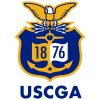Michael Plumley, Ph.D., M.S.E., P.E., Captain, USCG

CAPT Michael Plumley earned a Bachelor of Science degree, with High Honors, in Mechanical Engineering from the Coast Guard Academy in 1998. He served as Damage Control Assistant aboard the Coast Guard Cutter (CGC) Alert before taking an assignment as Port Engineer at the Coast Guard Naval Engineering Support Unit in Boston, Massachusetts, where he oversaw maintenance and repair of the Coast Guard’s Northeastern United States Search and Rescue fleet. In 2009, he was assigned as chief engineer of the Coast Guard’s first National Security Cutter, CGC Bertholf, shortly after commissioning. His tour of duty included the cutter’s first three operational patrols and first drydock.
CAPT Plumley served as Chair of the Coast Guard Academy’s Mechanical Engineering department from 2016-2020, overseeing the program’s largest enrollment, a successful ABET re-accreditation visit, and the program’s response to the COVID-19 pandemic. He has over ten years of collegiate teaching experience, including several upper level courses and research projects on respirator design, water desalination, engine efficiency, autonomous vehicles, and biomedical systems. He served as a visiting faculty member at Lawrence Livermore National Laboratory, where he conducted threat assessment in support of homeland security initiatives, and as a CMC Scholar at Sandia National Laboratory, where he investigated LNG carrier fire protection. CAPT Plumley is director of the Coast Guard Academy’s National Lab Internship program, and a member of the Maritime Risk Symposium planning committee. He serves on a technical committees of the Society of Tribologists and Lubrication Engineers (STLE) and regularly conducts scholarly reviews. He is a qualified sailing safety instructor for the Coast Guard’s Coastal Sail Training Program and holds a 100-ton Coast Guard Master’s license. CAPT Plumley is a registered Professional Engineer in the state of Connecticut.
Education
- Ph.D., Mechanical Engineering, Massachusetts Institute of Technology, 2015
- M.S., Naval Architecture and Marine Engineering, Massachusetts Institute of Technology, 2005
- M.S., Mechanical Engineering, Massachusetts Institute of Technology, 2005
- B.S., Mechanical Engineering, United States Coast Guard Academy, 1998
Courses Taught
- Advanced Engineering Math
- Design Project Management
- Mechanical Engineering (Capstone) Design
- Modeling and Control of Dynamic Systems
- Thermodynamics
- Heat Transfer
- Statics and Engineering Design
- Mechanics of Materials
- Ships and Maritime Systems
- Heat Transfer
- Machine Design
- Engineering Experimentation
- Mechanisms
Selected Publications and Presentations
- Patent – “Buoy Hull Corrosion Detection System,” M. Dougall, J. Rath, B. Curtis, L. Otto, R. McClimans, M. Williams, T. Rodziewicz, R. Adrezin, M. Plumley, Patent Number US10,692,352: June 23, 2020.
- Ott et al. “Guidance Document for Manufacturing Masks and Respirators for protection against COVID-19” May 21, 2020
- Siobhan McGirl. “Coast Guard Academy Working to Find Best Design for 3D Printed Masks” Published 5/6/2020.
- Plumley, M. and Pennington, J. (2018). “Opportunities for Remote Emissions Sensing to Determine Maritime Vessel MARPOL Compliance”. Presentation. STLE 72th Annual Meeting and Exhibition, Minneapolis, MN
- Plumley, M., Wong, V., and Martins, T. “Oil Degradation in a Diesel Engine with Dual-Loop Lubricating System,” Tribology Transactions. September, 2017
- Plumley, M., Wong, V., and Martins, T. “Demonstrating Improved Fuel Economy Using Subsystem Specific Lubricants on a Modified Diesel Engine,” Tribology Transactions. September, 2016.
- Plumley, M. and Wong, V. (2014). “Analysis of Shear-thinning on Engine Friction Using Mineral and PAO Base Oils”. Presentation. STLE 69th Annual Meeting and Exhibition, Orlando, FL.
- Plumley, M., Wong, V., Park, S. and Molewyk, M. (2014) “Optimizing Base Oil Viscosity for Power Cylinder Friction Response Temperature Dependency,” SAE Technical Paper 2014-01-1658.
- Plumley, M. (2009) “Using BlimpDuino in an Introductory Undergraduate Dynamic Modeling and Control Course,” 2009, ASEE Northeast Regional Annual Conference Proceedings
- Plumley, M. (2009) “CGA Cadets on Cutting Edge of Innovation at National Laboratories.” USCG Engineering, Electronics and Logistics Quarterly. Summer 2009.
- Foley, A.C. and Plumley, M. (2009) “Enthalpy in a Box. Teaching Open v Closed System Work Terms.” AC 2009-1620 ASEE 2009 Annual Conference and Exposition, Austin, Texas.
- Freeman, R.W., Phillips, E.H., Plumley, M., Adrezin, R.S., Egelhoff, C.J., (2009) “Service Learning Workshops to Recruit Women into Engineering.” Proceedings of NE ASEE 2009 Conference, Bridgeport, Connecticut, April 2009.
- Plumley, M., Palm, W. and Simpson, W. (2008) “A Common Design-Build-Test Project Incorporating Freshman and Senior Undergraduate Analysis Skills,” 2008, American Society for Engineering Education Annual Conference Proceedings.
Professional Memberships
- Licensed Professional Engineer, Connecticut
- Society of Tribologists and Lubrication Engineers
- American Society of Engineering Educators
